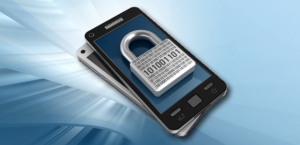MythBusters: 11 Mobile Security Myths
 Mobile Security can simply be defined as the applicable techniques put in place for the purpose of securing data on our mobile devices like tablets, smartphones, laptops as well as other mobile devices. In other words, this is different alternative methods mobile devices use for authenticating user and limit access to data store on their devices. Some of these means vary from simple password, screen locks and PINs (Personal Identification Numbers) to more complex eye scanners, fingerprint readers and several other varieties of biometric reader.
Mobile Security can simply be defined as the applicable techniques put in place for the purpose of securing data on our mobile devices like tablets, smartphones, laptops as well as other mobile devices. In other words, this is different alternative methods mobile devices use for authenticating user and limit access to data store on their devices. Some of these means vary from simple password, screen locks and PINs (Personal Identification Numbers) to more complex eye scanners, fingerprint readers and several other varieties of biometric reader.
The importance Of Mobile Security
Despite the fact that mobile technology devices is fast turning the entire world into global village by easing the convenience of online surfing, the magnitude of security risks attached to this feat cannot be undermined. These ever increasing and dynamic risks are not unconnected to the followings:
- Increasing potential cyberattacks on mobile devices
Cyberattacks on smarthphones and other mobile devices is now on regular occurrences, yet cybercriminals keep advancing in employing one form of forceful strategies or the other including Masque-Freak, Stagefright to Cored, YiSpecter to Wirelurker and water you. Hence, the seemingly unending vulnerability to exposing, malware to deploying techniques end up in loss of money and data after succeeded in corrupting the devices. Also, the volume of collected data being stored in the cloud even put question mark behind the so called privacy.
- The risks pose by smartphones is worrisome to businesses
Many firms now frown at individually owned mobile devices, some more now mandating devices uniquely devised by the organization with advanced security. This is leading to confusion, tension and misinterpretation in the corporate world, to say the least.
- The complexity of the threat is evolving
Researchers have admitted that abuse of apps and loss of device remains the major reason for the loss of data on mobile devices but with increasing and costly effects. For illustrative purpose, according to Gartner, while brokers keep using smartphones for sharing highly sensitive details while in healthcare, Doctors are fond of processing sensitive patients’ details, using smartphones. With reference to cybercriminals, the huge monetary value of mobile attack cannot be overemphasized. They essentially target these devices in order to penetrate and corrupt more machines. By this, they stand the chance of enriching themselves the more after exploiting their unsuspecting and innocent victims or auction their vital information in the black market. Obviously, these devices in question keep volumes of data and info with attached identities usable to infect or corrupt other services.
- The more the data, the greater the potential threat for mobile devices
Apart from the high volumes of data being generated day by day, individual at one place or the other, always store, and share and / or access internet using significant corporate or personal data. The IT security administrators are particularly worrisome with regard to the best security and management to highly sensitive organizational data. Meanwhile, this loophole has always been exploited by the attackers to infect and corrupt business.
What are the advantages of Mobile Security?
 Despite the obvious risks and myths being associated with mobile security, its numerous advantages cannot be overemphasized. Some of these inherent advantages include:
Despite the obvious risks and myths being associated with mobile security, its numerous advantages cannot be overemphasized. Some of these inherent advantages include:
- Effective improvement in network capacity
- Provision of better access to the most recent apps and quality services
- Greater assurance of good communication within and outside the office premises
- Increasing and faster means for wireless payment
- It enhances the service flexibility and quality being provided to customers
- Increasing staff productivity, efficiency and effectiveness.
- It is so dynamic and flexible
As a matter of fact, Mobile devices is increasingly facilitating the business and corporate world linking office network to office site where need be. Nowadays, making it easier to remotely:
- Create new customers’ account
- Scrutinize the details about the current customers
- Make online purchase
- View prices and the available stock.
Myths and Scientific Verdicts
Of course, the evolution and the rising demand for mobile device are not without are so many logical concerns, some genuine, while some are just figment of imagination. That is to say, the so called risks associating with mobile security are either underestimated or overblown. Hence, these misconception, if not put in proper perspective could compel business organizations to either erroneously undermine the main risks or over-concentrated on the trivial issues.
Myth 1: Non-compliance with BYOB implies absence of mobile security threats
Contrary to the opinions of most security experts, the newly developed mobile devices are simply designed with in-built computers. This is more extensive beyond those phones with handy apps. Hence you can equally be accessed it on mobile device so long it is accessible via web browser. Regardless of your position, therefore, the back-end systems in your device must be secured from unwanted access to your data.
VERDICT: False
Myth 2: The most popular mobile security is Malware
Despite the fact that Mobile malware is currently occupying the headlines, the actual threat still remains every business organization remains compromise or loss of data mostly cause by theft. This makes it easier for the criminals to undermine the remote wiping and the likes. Those whose data is kept on ant device are taking a big risk, just like forgetting your laptop inside public transport.
VERDICT: False
Myth 3: Your current DLP (Data Loss Prevention) plan is always suitable for mobile device
The conventional DLP solution wrongly has the notion that an imaginary huge software is always there or secure perimeter is shielding that every data and each device.As far as mobile world is concerned, data must always accessible, regardless of the location. It is advisable that you facilitate the security the access to your data.
VERDICT: False
Myth 4: The device is the only storage of mobile data
The actual location or position of data could be very be deceptive and unpredictable between mobile networks and cloud services. Unfortunately, firms are often made to understand that mobile data in always stored on the actual device it is saved. Alternately, a data-first security approach is required for the purpose of tracing data to prompt response, and yet preserve the native app experience of the respective users.
VERDICT: False
Myth 5: Mobile devices are remains current and self update
The consumer-cloud services often misconceived the fact that over the air updates from carriers usually keep mobile devices up to dates. This varies as huge ecosystem fragmentation exposing most of the users to impending danger which are already covered during upgrades that cannot be verified. Unlike cloud services like Salesforce.com or Google Apps that are self updated on server and ever remain current, those apps on device require manual update every time in compliance to the latest version.
VERDICT: False
Myth 6: Only containers or MDM guarantees security
Each of the above alternate techniques for keeping devices secured. This is misconception can be misleading as none of them has the capacity to secure any corporate data, particularly while in cloud services. Despites their usefulness, they are grossly inadequate to be seen or referred to as the basis for strategic mobile security. Besides, they are more of device selective, very intrusive and therefore discouraging.
VERDICT: False
Myth 7: Public app stores are save every time
Not even Google or Apple can actually vouch for each hosted apps on respective corporate network, despite their strict internal control and security checks. With regard to Google play store, Malware symbolize bigger concern yet latest report indicates that malicious codes can still escape from the so called heavy scrutiny. Besides, a lot of app developers do request for excessive app license since there it relatively costs nothing. By implication, users are vulnerable to attack as they motivated move in unsafe ways. For this reason, it is very vital that you ensure restrain access to your data is as crucial as getting secure apps fully compliance to the sensitivity of corporate undertakings.
VERDICT: False
Myth 8: The public wi-fi remains unsecured
With the application of VPN( Virtual Private Network)connection, you can reliably use public wi-fi securely, ignoring the attached security risks. Since VPNs make use of dedicated encryption and connections, it creates very effective approach of developing secured connections anytime you find yourself outside the corporate network. Alternatively, where available, the application of 3G or 4G services could as well be forced to on the device and not necessarily wi-fi. In fact, cellular networks are far secured when compared to public wi-fi, so it is advisable that you buy bolt-on data for your routine data plan for enterprise use. Meanwhile, enterprise must be weary of the associated security risks like Jasager and over the air packet interception. Interestingly, with the application of cellular networks, these threats are drastically minimized.
VERDICT: Partially true
Myth 9: IT must determine the destination of data
The rising numbers of tech-savvy users are always finding ways of different approach of increasing their output. As good as this may appear, if the attendance security risk is not properly addressed, it could have damaging implication. To avoid this, IT really needs to work hand-in hand with the end-users, pay good attention to their operation and then get the processes secured.
VERDICT: Partially true
Myth 10: Management tools are threatening user privacy and experience
There is increasing worry as ignite by MDM that IT is capable of spying on or regulating on the activity of the user on their respective private device. As more and more users have formed the habit of continuously coming along to office with their devices, we must presume that they are actually sharing their devices with their family while in office. Having realized that spying on users is technically achievable, and then the application of solution of such exposes the firm to liability threat where the tools are judiciously utilized. Solution for this genuine worry has gone beyond soliciting for the trust of the users neither can it be resolved by issuing them ultimatum to accept or desist further usage of their individual device.
VERDICT: True
Myth 11: Users are posing security threat
 This is not to say that users are deliberately attempting to sabotage corporate security or being ignorant about their operation. Indeed, users are rather doing their best to carry out what they find out to be the most suitable. This is simply implies looking out for the fastest and simplest methods of performing their assignments for maximum returns. And they do not care breaking the protocol or using prohibited cloud devices and services.
This is not to say that users are deliberately attempting to sabotage corporate security or being ignorant about their operation. Indeed, users are rather doing their best to carry out what they find out to be the most suitable. This is simply implies looking out for the fastest and simplest methods of performing their assignments for maximum returns. And they do not care breaking the protocol or using prohibited cloud devices and services.
Obviously, end-users are very much reluctant to part way with their initially preferred experience of the apps and devices. Yet they are refusing to even operate or camp in isolated and remote container that limits their incorporated experience. As they continually applying their unique devices, they have are not only worried about the threat to their privacy, they have also refused to relinguish its control to their employer. In this regard, it is very crucial working with your users thereby developing a secured mobile solution that is not restrictive and allays fear. In the first instance, they may decide to flout you’re your policies and even abandon totally listening, which it a suitable formula for security gap. Also, Users stick to their individual devices because they believe that they can perform maximally using their own device rather that the enterprise-giving ones. It advisable that you work closely with respective users in order to address their fears while ensuring that they still sustain same level of their output. Better still, don’t be too much bother about the device and the usable application. Be rather more attentive to how best you can secure access to your data.

 Top Career Opportunities for Financia...
Top Career Opportunities for Financia...
 Top Free Digital Marketing Certificat...
Top Free Digital Marketing Certificat...
 10 Most Valuable Certifications for I...
10 Most Valuable Certifications for I...
 10 Most Wanted Tech Jobs for 2018
10 Most Wanted Tech Jobs for 2018
You must be logged in to post a comment.